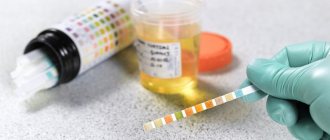This is not to say that the unusual smell of urine in females is a rare occurrence. Moreover, every day many women turn to their doctor with such a complaint. Discharge with the smell of ammonia makes you seriously worry. And rightly so!
If the urine smells like ammonia or acetone, then this means a certain disorder that has appeared in the female body. It is unrealistic to identify it on your own (unless the woman, of course, has the necessary qualifications). Therefore, only a specialist can determine the diseases that provoke this phenomenon. Moreover, it is necessary to contact immediately, and not hope that the body will cope with the problem itself.
Only a professional consultation and a series of examinations in a special laboratory will be able to establish the reasons why women’s urine smells like ammonia. Below we list the main factors that provoke this symptom.
Diseases and smell of urine
Some diseases and pathologies in the body can affect the composition of physiological fluids, thereby changing their density, color and smell. Deviations in the organoleptic parameters of urine most often indicate pathologies in the genitourinary system. Let's consider the most likely situations.
Various jades
With hypothermia, injury, or penetration of bacteria from neighboring organs and tissues, an inflammatory process may begin in the kidneys. This is the first organ in which urine begins to form, so pathologies are reflected in its smell.
The following signs indicate kidney inflammation:
- increased body temperature;
- pain in the lumbar region;
- fever.
Urine with kidney disease takes on the smell of ammonia.
Cystitis
This disease is rare, but does occur in men and is an inflammation of the bladder. Pathology occurs for various reasons and is accompanied by some clear signs:
- pain in the lower abdomen;
- burning and pain when urinating;
- discharge from the penis.
The smell of urine in this case will be sharp, fetid, and unpleasant. Treatment should begin as early as possible, avoiding the development of complications that will be difficult to cope with.
Urolithiasis disease
For various reasons, various stones can form in the bladder, kidneys and pelvis - oxalates, urates, and so on. Accumulating in the lumens and cavities of organs, they impede the outflow of urine, damage the mucous membrane, resulting in favorable conditions for the development of bacteria. Also, with urolithiasis, the composition of urine changes, so the smell of ammonia appears.
The pathology may not manifest itself in any way for a long time. But, if the stones are moved by a current of urine, severe pain occurs in the lower abdomen, perineum and penis. The nature of the pain is sharp, paroxysmal, and prolonged.
BPH
Benign prostatic hyperplasia (prostate adenoma) is more often detected in men over 40 years of age. The disease is characterized by a violation of the outflow of urine, which leads to a change in its smell.
Other symptoms are:
- pain when trying to relieve minor need;
- pain in the perineum and lower abdomen (may radiate to the sacrum or scrotum);
- problems with erection.
BPH can be treated well with surgery. The sooner a man consults a doctor, the less damage to the body will be. Without medical care, there is a risk of developing acute urinary retention, kidney failure and other problems.
Prostatitis
Prostatitis is an inflammation in the tissues of the prostate gland that occurs during hypothermia, injury, or infection with STIs. It is characterized by a complex dysfunction of the genitourinary system, which is manifested by the following deviations:
- pain in the perineum;
- sluggish stream of urine, pain when urinating;
- erectile dysfunction.
Acute prostatitis may be accompanied by high body temperature, fever, nausea, and constipation. The smell of urine in this disease is very unpleasant and difficult to describe.
What causes urine odor?
Why urine smells in men: possible causes and treatment
Like men, changes can occur in the female body that provoke the appearance of odor. They are associated with the following factors:
- Eating food. Certain foods have a strong aroma that lingers. If a person has dined on a dish with onions, garlic, horseradish, then an unpleasant odor will appear not only from the mouth. After the process of digesting food, the urine may smell like smoked or roasted seeds, and a spicy aroma appears.
- Taking medications. This can be long-term use of antibiotics - in tablet form or injectable. Also, taking vitamin complexes, especially group B, provokes a pungent odor. After stopping the use of these medications, the problem goes away.
- Lack of proper hygiene. Some women do not know how to properly care for their genitals or do not maintain hygiene. Immediately after washing, the bad odor disappears, but over time it appears again. Women in old age need to take special care of genital hygiene. Some older people note that the smell appeared immediately after or during menopause.
- Dehydration of the body. If the problem appears exclusively in the morning, its cause is increased concentration and density of urine. The smell can also be associated with late visits to the toilet, when a woman endures it for a long time, sometimes all night (a common problem in children).
- Alcohol. The acrid smell of urine will certainly appear after drinking large quantities of alcohol.
Whichever of the above factors is the reason why a woman’s urine smell has changed, no special measures are needed to treat it, just actively follow all the rules of hygiene
It is important to eliminate the cause, then there should be no trace of the problem within 24 hours. If this does not happen, there is a reason to contact specialists for examination.
Causes of unpleasant odor
The nature of the aroma itself will help determine the cause. For those who have never encountered such a problem, it may seem that it is impossible to classify an unpleasant odor. In fact, there are several possible options.
A common cause is a fungal infection, often caused by candida. The characteristic smell of urine as a result of fungal infection is sour. Other symptoms are:
- constant itching, burning in the labia and vagina;
- tingling, discomfort when urinating;
- the color of urine becomes rich, yellow, cloudy;
- discharge appears, as with thrush.
Sexually transmitted diseases are also a common cause. Their occurrence is associated with the action of a sexually transmitted infection. The smell of discharge becomes fishy with bacterial vaginosis, and can be so strong that it can be felt from a distance. It is also transmitted through urine. Gynecologists note the most common sexually transmitted diseases that can be detected in a girl:
- trichomoniasis;
- chlamydia;
- mycoplasmosis;
- gonorrhea.
Each of these infections is accompanied by different symptoms
Often women pay attention to the following signs - traces of heavy discharge, stains on underwear, pain when urinating when cystitis occurs, decreased libido, painful sexual intercourse, a constant feeling of discomfort
Another common cause is E. coli, which affects the urinary tract and genitals. Most often, infection occurs due to non-compliance with hygiene rules. Urine with E. coli acquires an unpleasant odor.
Other reasons
Less common are the following reasons for the smell of urine in women:
- Diabetes. As blood sugar rises, the level of acetone increases. The more its value exceeds the norm, the stronger the smell will be. In diabetes, urine smells like rotten apples.
- Malabsorption. This is a disease of the intestines; it cannot cope with the absorption of nutrients from food, which leads to their deficiency in the body. The urine smells like beer. This smell can also be observed with hypermethioninemia and liver failure.
- Leucinosis. The disease is transmitted at the genetic level, which creates problems with its treatment; it is chronic. The aroma of urine is sweetish, similar to the smell of maple syrup. When the disease is in the acute stage, it becomes too cloying and an admixture of rot appears.
The smell of ammonia is present in the urine of every person, only in a healthy body it is weakly expressed. If it intensifies, this indicates the onset of inflammatory processes: cystitis, urethritis, kidney disease.
Diagnostic measures
Quite informative is the titrimetric method for determining ammonia using the indicator - methyl orange and setting up a color reaction with Nessler's solution.
Normally, plasma ammonia should not exceed 7-22 µmol/l. In urine there are 10-30 mcg/100 ml, and its daily amount includes 30-60 mmol (0.5-1 g).
Methods
The amount of ammonia in biological fluids is extremely small, which makes it difficult to determine its true level. To study samples, in addition to titrimetric methods, photometric, gas chromatographic, and potentiometric methods are used.
To clarify the reason for the increase in this value, it is recommended to undergo an additional examination, including the following diagnostic measures:
- general blood and urine analysis;
- biochemical tests (renal, liver, protein, albumin);
- bacteriological culture of urine for microflora;
- indicators of acid-base status;
- water and electrolyte balance;
- antiglobulin test - Coombs test to detect hemolytic anemia;
- donate blood for markers of viral diseases.
It is also recommended to conduct an ultrasound examination to determine the extent of damage to internal organs.
Features of preparation
Serum is used to study the level of hydrogen nitride. To obtain it, a test tube with an anticoagulant is completely filled with venous blood and mixed thoroughly. At the same time, it is important to avoid the destruction of red blood cells, as well as contact of the biomaterial with the patient’s sweat - this can cause a false overestimation of the results. If transportation is necessary, plasma is frozen.
Urine is collected in a disposable plastic container after thorough toileting of the external genitalia. Women should wait until their period ends.
It is important to know! After collection, urine is examined as soon as possible. If it stands for a long time, there is a high probability of loss of ammonia or its increase under the influence of microorganisms. If it is not possible to perform the analysis immediately, a preservative is added to the sample and stored in a cool place.
On the eve of the test, you must adhere to the following recommendations:
- refrain from sexual intercourse and heavy physical activity;
- maintain your usual drinking and eating regimen;
- limit the consumption of vegetables, fruits, meat products;
- with the permission of the doctor, temporarily stop taking barbiturates, narcotic painkillers, diuretics;
- avoid prolonged exposure to the sun;
- exclude smoking, alcohol, visiting the bathhouse, sauna.
It should be borne in mind that the concentration of ammonia in the body increases during fasting, as well as in the first trimester of pregnancy.
What diseases can change the smell of urine in a child?
Why does women's urine smell like fish?
Let's look separately at cases involving children:
- Only newborns will have no odor in their urine. As you grow older, your urine will take on characteristics characteristic of adult urine.
- An unpleasant odor of urine in infants is one of the signs that the child has a genetic disease.
- For example, why does the urine of a 5-year-old boy smell sharp? This may indicate a genitourinary disease in the child.
- Urine in children acquires a pungent odor at high temperatures and dehydration (often these factors are related). In such cases it becomes more concentrated. This will be the cause of the smell. Try to give your baby as much fluid as possible.
- If a baby is breastfed, the smell of his urine often reflects what the mother ate. We have already said which products give urine a pungent odor.
In conclusion, about our little brothers. Reasons why a cat has smelly urine:
- Just like in humans, the strong smell of ammonia from urine will indicate dehydration.
- The animal has entered the period of puberty and hunting. The smell is caused by increased activity of the sex glands.
- The cat's diet is incorrect. The reason is a protein imbalance.
- Disease of a genitourinary nature. Everything here repeats the human situation.
- Hormonal diseases, cancer. An alarming sign is a putrid smell. Often he alone can speak about a serious pathology.
- Severe stress. The pungent odor in this case is a disruption in metabolic processes.
If an unusual smell appears for no apparent reason and does not go away within 2 weeks, this is a reason to take the animal to the veterinarian.
So we have figured out all the reasons for the strong smell of urine. Even if some of them are harmless, this is still a sufficient reason to consult a doctor.
Smell of acetone and ammonia
Diabetes
Cloudy urine in women: why it is dangerous, causes and what to do
The smell of acetone in the urine of women may appear due to diabetes. In diabetes mellitus, there is a lack of glucose, so the body's defense mechanism is triggered in the form of the release of acetone.
Acetone promotes the penetration of glucose into cells, but has side effects on the entire body. Symptoms of diabetes, in addition to the smell of urine, include thirst due to dehydration, peeling skin, muscle spasms, and abdominal pain.
Gestational diabetes
Foul-smelling urine during pregnancy may be a sign of gestational diabetes. The smell in women signals the accumulation of acetone in the body. This usually happens due to toxicosis. With toxicosis, water and other substances needed by the body are lost.
Gestational diabetes is dangerous for both mother and baby; it can develop into diabetes mellitus. Symptoms include malaise, sleepiness, and dizziness.
The smell of acetone in the urine of women during pregnancy serves as a signal for testing for ketone bodies. If deviations from the norm are found, the patient is hospitalized.
Prevention from the accumulation of acetone is:
- diet: vegetable soups, lean meat, apples, cottage cheese;
- sufficient fluid intake. If a woman is tormented by vomiting, Regidron, Gastrolit and other solutions will help preserve nutrients in the body;
- the use of sorbents, for example, activated carbon;
- droppers with glucose or vitamins to saturate the child with the necessary substances.
Liver diseases
Liver disease is the reason why urine smells like acetone in women. Hepatitis and cirrhosis of the liver in women reduce the body's ability to produce enzymes, metabolism is disrupted, and this contributes to an increase in the concentration of acetone in the urine.
Exhaustion of the body due to fasting
In pursuit of a beautiful figure, ladies often refuse food or significantly reduce its consumption. The body starts the process of replenishing the lack of glucose by breaking down proteins and fats, which leads to the formation of ketone bodies. The smell of acetone appears in the urine of women.
Infectious diseases
Intestinal infections, flu, meningitis and other infectious diseases accompanied by fever and loss of fluid cause an increase in the level of ketone compounds in the body.
Here is another factor why urine smells like acetone in women.
Inflammatory processes
If urine smells like ammonia, the body can give such a signal when:
- cystitis;
- urethritis;
- pyelonephritis.
With pyeloniphritis, the kidney tubules become infected with E. coli. The disease is characterized by acute pain in the lower back, high fever, and pain during bowel movements.
Cystitis can occur against the background of pyelonephritis or be its cause, affecting the bladder. The causative agents are streptococcus, Escherichia coli or Pseudomonas aeruginosa, chlamydia and others. Signs: frequent urge to go to the toilet, pain when urinating.
With urethritis, inflammation of the urethra occurs. The disease occurs with pain and burning when urinating, frequent bowel movements, and incomplete emptying of the bladder.
Tuberculosis and oncological malignant tumors
By analyzing the urine of patients with tuberculosis, it is possible to detect the presence of protein and leukocytes in it, this explains why urine smells like ammonia in women. When sick, urine often contains blood. In the case of oncology, the unpleasant odor of urine in women is accompanied by a general deterioration of the condition and a weakened immune system.
Description of the problem
The urine of a healthy person has some odor, but it is not unpleasant or foul-smelling. Therefore, the specific smell of acetone in urine should cause some concern. An unpleasant odor does not mean that there is some kind of pathology in the body; it is likely that it is caused by taking medications or unhealthy eating habits. But it is still recommended to pay attention to changes in health status and determine the reasons.
The smell of acetone in urine is an alarming sign that requires attention. Acetone is an intermediate substance in the process of breakdown of fat and protein structures; it is always found in moderate quantities in the human body. Formed in the form of ketone bodies, it can appear not only in urine, but also in human saliva. This certainly indicates pathological processes in the body and requires prompt medical intervention. After all, in a healthy person, ketone bodies are eliminated from the body through breathing or through the urinary system.
Pathological causes
If the natural factors listed above are absent, and the urine still has an unpleasant odor, then this indicates a negative impact of the pathology developing in the body. The main causes are the following diseases:
Cystitis
The smell of ammonia in urine often appears due to inflammatory diseases of the mucous membrane of the bladder. As a rule, cystitis develops due to infections, but often the cause is ordinary hypothermia (swimming or winter walks in light clothing). Symptoms of the pathology depend on the form of the disease. If the stage is chronic, then the disease is manifested by frequent urges, sharp pain at the exit of the urethra, blood in the urine and heaviness in the bladder. If the acute phase is detected, then when urinating, cramps and pain in the abdomen are observed. Possible weakness. It takes longer to urinate due to pain. Another symptom of acute cystitis may be cloudy urine.
Urethritis
The most common cause of inflammation of the urinary system is the entry of pathogenic microorganisms. The manifestation of the disease is cutting pain, as well as changes in the characteristics of urine.
Pyelonephritis
Inflammatory processes in the kidneys caused by infection. Along with a change in the characteristics of the fluid that removes waste products from the body, symptoms such as fever, chills and lower back pain are observed. With inflammation of the kidneys, urinary disorders cannot be ruled out.
Venereal diseases
Infection and unpleasant odor of urine are two interrelated components. Changes occur due to inflammation of the genitourinary organs.
Diabetes
With this disease, the content of ketone bodies increases. Also, the reason for the change in smell is constant dehydration - one of the main symptoms.
Hepatitis
With an infectious lesion of the liver, a change in the characteristics of urine occurs. It becomes dark, and this appearance remains throughout the entire duration of the illness.
Metabolic disease
Another common reason. Metabolic disorders provoke various abnormalities that occur in the body. This also applies to changes in the properties of urine.
Also factors that cause changes in color and odor include tuberculosis and cancer pathologies. Do not forget that these diseases are often treated with medication. Medicines, as already mentioned, contribute to changes in the color and smell of urine. It may start to smell like acetone or ammonia.
With pathology, a large amount of ammonium phosphate accumulates, which leads to these metamorphoses.
Ammonia-smelling urine during pregnancy
Almost all women notice changes in the properties of urine during pregnancy. It begins to smell unpleasant and changes color. This scares many people. As statistics show, in most cases there is no danger to health, and such manifestations have the following reasons:
- hormonal changes occur in the body;
- constant dehydration due to the baby’s high water consumption;
- consumption of certain groups of vitamins.
But not everything is always explained by the listed factors. Often, changes in the color and smell of urine are a harbinger of developing diseases.
During pregnancy, compression of the ureters occurs, which contributes to prolonged urinary retention. Such conditions are favorable for the appearance of harmful bacteria in it. They, in turn, contribute to the development of infections.
Changes in urine color and odor can also occur with gestational diabetes. It appears due to insufficient insulin production. This phenomenon is explained by the large release of various substances necessary for the development of the baby. They inhibit the production of the hormone.
Unpleasant odors during urination can also occur due to inflammatory processes, which pregnant women are often susceptible to. It is especially worth highlighting kidney diseases, which arise due to constant compression and imbalance of water balance in the body.
You should not resort to self-diagnosis and treatment. Only a special urine analysis can show the true cause of the deviation. And only on its basis can a course of treatment be prescribed.
Dehydration
Urine is mostly water, so it doesn't smell. If there is little fluid, dehydration occurs. It can be caused by several reasons - vomiting, diarrhea, insufficient water intake. All of these conditions cause the urine to smell like ammonia.
The change in odor is caused by an increase in the concentration of chemicals in urine. The kidneys retain fluid but continue to excrete waste products. One of them is urea. It is a by-product of protein breakdown. When dehydrated, the substance breaks down into components that cause an ammonia-like odor in urine. Its color also changes - from pale yellow to cloudy dark mustard.
To prevent lack of fluid, drink at least 8 glasses of water daily. This amount will dilute the urine, eliminating the unpleasant odor. With excess water, urine becomes almost colorless. Excessive hydration is also harmful to the body, so control your water balance and do not drink too much.
- What will happen to military pensions in 2021
- Due to the introduction of labeling, there may be a shortage of medicines
- Signs you've got 'the world's deadliest disease'
Why does urine smell strong in adults?
Strong urine odor can be caused by both physiological and pathological factors.
The strong odor emanating from urine and its dark color are a phenomenon that should alert absolutely every person. Of course, when a problem is discovered, there is no need to sound the alarm, but it is imperative to approach it with the proper measure of responsibility. First, try to remember your diet for the last 1-2 days. U
Surprisingly, a number of food products often change the color of urine and give it an unpleasant odor. The most used of them are the following:
- garlic
- horseradish
- most seafood
- asparagus
- sugar cane
In addition to food, changes in the properties of urine can occur under the influence of certain medications and decoctions, herbal infusions
Given such features, it is very important to identify their specific relevance to your situation. It is worth understanding that over time the smell will go away and the color of the urine will normalize.
For example, in the case of a drug-related problem, it will disappear after 2-3 days after completing the course of therapy, and in the case of a food-related problem, recovery will take no more than a day.
There is absolutely no need to worry under such circumstances, since changes in urine in such situations are absolutely natural and indicate the normal functioning of the body’s urinary system. In the absence of the previously presented features of cases of problems with the smell and color of urine, the problem most likely lies in the pathological condition of one of the nodes of the body.
It is almost impossible to identify the disease without the help of a specialist, so turning to one cannot be avoided.
As a rule, the cause of unpleasant odor in urine is the development of one of the following diseases:
- cystitis (chemical smell)
- venereal pathologies (fishy smell)
- urethritis (particles of blood are additionally observed in the blood)
- inflammation of the kidneys (accompanied by severe lower back pain)
- diabetes mellitus (from the sweetish smell of apples to a strong chemical smell)
- disturbances in the body caused by fasting or dehydration (smell of ammonia)
- liver failure (beer smell)
- a number of hereditary ailments - leucinosis, for example (odors of a completely different nature: from sweetish to chemical and ammonia)
It is important to understand the seriousness of the problem and if urine smells or changes in color, take appropriate measures. Otherwise, the risk of developing an existing disease is enormously high, which is very bad for any person, because treating diseases in the early stages is much easier than already advanced ones
Causes of unpleasant smell of urine in a child
An unpleasant smell of urine in a child is a sign of pathology!
An unpleasant smell of urine in a child is a phenomenon that requires enormous attention from his parents. Often the reasons for changes in urine are the same as in adults, but in some cases there may be completely different ones, unique to children.
The most striking example of this etiology of the problem is a lack of vitamin D in a child. This pathology is accompanied not only by an unpleasant odor of urine, but also by increased sweating and groundless weight gain.
In addition, changes in urine in children can be caused by:
- colds
- metabolic disorders in the body
- lack of fluid intake
- in the case of infants - incorrect diet of the nursing mother
It is important to understand that a strong smell of urine in a child is a fairly serious problem, especially if it does not disappear for several weeks. In this case, you should not self-medicate, but you must immediately take the child to the clinic, conduct a comprehensive examination of his body and identify the true cause of the problem.
Only by such actions can any parent guarantee that his child will grow up healthy and that existing disorders in his body will be eliminated on time and without consequences.
Causes and symptoms
Let's look at why urine has an unpleasant odor in women. Among the most common causes of changes in urine odor are the following:
- bacterial and infectious lesions of the genitourinary system;
- long-term use of medications;
- disturbances in the functioning of the digestive tract;
- progressive diabetes mellitus;
- neoplasms in the urethra or bladder, which do not allow urination in full, due to which pathogenic microorganisms actively multiply in the remaining urine;
- pregnancy;
- sexually transmitted sexually transmitted diseases;
- violation of the diet, as a result of which the body does not receive the required amount of vitamins and minerals;
- stagnant processes in the urethra, which are achieved due to a long absence of urination.
Among the most dangerous diseases that can manifest themselves by changing the smell of urine are:
- Pyelonephritis is an extensive inflammatory process of the renal cavity. It is caused by the activation of pathogenic E. coli, which provokes inflammation, giving the urine an extremely unpleasant odor.
- Cystitis is an ascending (from the urethra to the bladder) or descending (from the bladder to the urethra) infection that causes not only an unpleasant odor in the urine, but also painful urination. In the case when, due to the lack of timely treatment, cystitis becomes chronic, the unpleasant odor of urine can accompany the woman constantly, intensifying during periods of exacerbation of the disease.
- Urethritis is an inflammation of the urinary tract, in which the disease is provoked in most cases by sexually transmitted microbes (gonorrhea, syphilis, ureaplasmosis).
- Liver failure - urine turns brown, with a predominant odor of rotten fish or garlic.
The most rare and less dangerous causes of changes in urine odor can be caused by:
- Vaginal dysbiosis is a condition of the vagina in which the amount of opportunistic microflora is unstable at different times of the day.
- Dehydration – when there is an acute deficiency of fluid in the body, the kidneys are idle for a long time, which leads to the development of pathogenic microflora.
In fact, many more reasons for the appearance of unpleasant odor in urine can be identified.
Only a doctor can determine the true cause, based on the results of laboratory tests of urine and blood, as well as after collecting an extended medical history.
In most cases, an unpleasant odor is the first signal of the presence of an infectious lesion. If you do not respond to such manifestations in time, the amount of pathogenic microflora will increase exponentially every hour, which can further affect your health and the duration of treatment. In this case, other symptoms may accompany the unpleasant odor:
- sharp, spasmodic pain when urinating, both in the urinary canal and in the bladder;
- urination with blood;
- lower abdominal pain;
- unpleasant odor after sexual intercourse, as well as its pain.
In the presence of such manifestations, it is necessary to begin symptomatic treatment as quickly as possible in order to eliminate the risk of developing an extensive inflammatory process.
Types and origin of odors
Urine removes metabolites of bacteria and viruses from the body. Own metabolic products also enter urine, which flows from the kidneys into the bladder, so sometimes you can suspect an illness just by sniffing the patient’s urine.
The causes of stench are varied. For example, when an adult’s urine smells like acetone, this is a clear sign of diabetes. Other possible causes of this condition include pregnancy, dehydration, or infections.
Treatment with antibacterial drugs can cause a side effect - a change in the smell of urine. Urine smells like medicine after Augmentin, Penicillin, Ampicillin and Ceftriaxone. A similar phenomenon is possible in those who take vitamins (B1, B6, B12).
But sometimes the stench is not associated with illness. Those who like to eat smoked meat or fish, those who generously flavor their food with spices and seasonings with a bright aroma, spicy cardamom seeds, may notice an uncharacteristic odor when urinating. Urine begins to smell after abusing the following products:
- onion;
- garlic;
- horseradish;
- asparagus.
Periods of hormonal fluctuations in adolescence, as well as in premenstrual days during menopause in women, can also be accompanied by a change in the smell of urine. At this time, due to the high (or, conversely, too low) content of biologically active substances in the blood, the liquid filtered by the kidneys acquires a sharp “aroma”.
Many people notice that men's urine has a special, more pronounced smell than women's. This is the norm. The phenomenon is associated with high levels of the hormone testosterone in the urine. But often the smell appears after drinking a large amount of alcohol, especially beer.
Acetone smell
The “aroma” of acetone in the morning indicates stagnation in the kidneys. The condition develops if a person drinks little fluid or spends a lot of time sitting.
A smell reminiscent of a mouse warns of phenylketonuria, a congenital genetic pathology. In this disease, the synthesis of the amino acid phenylalanine is disrupted. As a result, the chemical composition of urine changes. If treatment is not started in time, the disease leads to severe disorders in the central nervous system and mental retardation. Diagnosis of this pathology in an infant is carried out already on the first day of life.
Fishy smell
A strong fishy odor from urine indicates another health problem – trimethylaminuria. Its cause is a violation of the enzymatic function of the liver. Because of this, tretylamine accumulates in the body, which is later excreted in urine and sweat. Sometimes the smell is so pungent that a person suffering from trimethylaminuria experiences psychological discomfort in the company of other people.
Ketonuria during pregnancy
The acetone odor in the urine and the appearance of ketone bodies in pregnant women is most often associated with toxicosis. Even if there is no vomiting, this condition can occur due to decreased appetite, insufficient food and water intake. To rule out diabetes, you need to check your blood for glucose levels. Before donating urine, it is not recommended to eat salty, spicy, fatty and smoked foods.
The appearance of an ammonia odor may be a symptom of gestational diabetes mellitus (occurs in 2-6% of pregnant women). Therefore, all women up to 24 weeks are required to determine the level of fasting glucose in the venous blood. This disease is temporary, developing in most cases at the end of the 2nd trimester of pregnancy and stopping after childbirth. The reason for its occurrence is a change in carbohydrate metabolism as a result of the increasing nutritional needs of the fetus, a decrease in sensitivity to glucose and insulin. Risk factors for gestational diabetes mellitus include:
- obesity;
- presence of relatives suffering from diabetes;
- late pregnancy;
- polyhydramnios;
- the woman has a history of giving birth to children weighing more than 4.5 kg;
- rapid weight gain.
Gestational diabetes poses a threat to the health of the mother and unborn child:
- premature birth and spontaneous abortion (30-50% of pregnant women);
- high mortality among newborns (5 times more);
- development of edema;
- increased blood pressure;
- diabetic fetopathy of newborns (increased body weight, excessive hair growth, short limbs, enlarged liver, spleen and other internal organs);
- fetal hypoxia;
- metabolic disorders in a newborn (decreased levels of glucose, calcium, magnesium, increased bilirubin in the blood);
- During adolescence, a child may develop obesity, hypertension and diabetes.
According to medical research, gestational diabetes is detected again during subsequent pregnancies in half of women, and in 25-75% of cases diabetes develops after a few years.
Diseases
Discharge with the smell of urine in women, if you have ruled out errors in caring for the intimate area, indicates a disease. The presence of other pronounced symptoms will not allow you to doubt this.
Candidiasis. A fungal infection accompanied by a cheesy white discharge. Popularly called thrush. With this disease, patients complain of a sour odor from the genital tract.
Dysbacteriosis. When the microflora of the vagina is disturbed, when the balance between opportunistic and beneficial bacteria is shaken, discharge appears. The culprit is weakened local or general immunity, plus other conditions favorable to microbes.
It is worth noting that the smell can be described in different ways. So, for some it will be the smell of urine from the vagina, while others will smell acetone or fish, even the smell of onions. The line is very thin and depends on the sensitivity of smell and the presence of certain opportunistic microorganisms.
A disease such as vulvovaginitis is very common, especially in girls. In this case, the inflammation affects the vagina and external genitalia. The cause of unpleasant sensations is STDs (chlamydia, myco- and ureplasma, gonococcus or trichomonas), as well as opportunistic microbes.
If you notice the smell of acetone, you should be tested for diabetes. Ketones accumulate in the body and are excreted along with secretions and other fluids. If your vagina smells like urine and acetone, you should consult a doctor and conduct a comprehensive examination.
Acetone syndrome can appear not only due to diabetes. Here are a few more factors that cause an unpleasant odor:
- the woman drinks little clean water;
- there is an excess of protein in the diet;
- metabolism is impaired;
- there may be a hidden disease of the urinary system in the body.
The predominance of a metallic odor in the discharge is always noticeable during bleeding. This phenomenon is typical during menstruation, as well as if a woman is diagnosed with erosion. After mechanical impact - examination or sexual intercourse - brown mucus may appear. When the microflora changes in the vagina, the smell of semen may appear.
Determination of the amount of acetone in the body
There are two main ways to diagnose the amount of acetone in urine:
- Get tested in the laboratory
. If you suspect an increased amount of acetone in the urine, the doctor will prescribe a referral for a general urine test. This analysis is taken in the morning, in a clean and dry container, in compliance with standard morning hygiene. - Do the test at home
. Due to the spread of the problem of acetone in urine, tests for determining the amount of acetone in urine began to be freely available in pharmacies.
It is recommended to purchase not one, but several tests at once. Conduct testing in the morning for three days in a row. The test strip is lowered into a container with collected urine, a waiting time is maintained and the result is assessed. The number of ketone bodies is determined by the color of the band. Pink color means the presence of acetone in the urine. Purple color means excess acetone. Of course, the result of home testing will not be accurate, but it will establish the very fact of the presence or absence of a pathological amount of acetone.
Important to remember! The normal level of acetone in urine is 0.01-0.03 g per day.
If there are no ketone bodies in the urine, this is normal. If there is an insignificant, minimal amount, there will be a plus on the analysis form. One plus means that the reaction is weakly positive. Two or three pluses are positive, and four or more are critical.
Of course, the outpatient option is preferable, since not only the presence of ketones is analyzed, but also their ratio. Ultrasound of the abdominal organs, CT, MRI, and tests for tumor markers may also be prescribed.
Liver odor of urine
In patients with liver damage, mercaptan is formed in the body, the smell of which is difficult to confuse. It is so nasty that it is added to natural gas to detect leaks.
It is difficult to describe what mercaptan smells like. It is said to reek (this is the most appropriate description) of mice and decaying flesh. The appearance of such a fetid mixture indicates a severely advanced form of the disease. This is also indicated by a change in the color of urine, which darkens and foams, becoming like beer. Changes in the liver can be detected by undergoing an ultrasound of the liver. Unfortunately, ultrasound alone may not be enough, then you will have to undergo various procedures - x-rays, biopsy, liver tests, etc. You can undergo an ultrasound without a referral, and then visit the right doctor with the results.
Urine in a child
The urine of newborns is odorless. When breastfeeding, it can acquire a barely perceptible aroma of the foods that the mother eats. With the introduction of complementary foods and with age, urine begins to smell brighter, sometimes not too pleasant.
When the aroma of baby urine becomes pungent, with different unusual shades, it is important to look for the cause. With congenital pathology, the stench will be noticeable from the first days of life:
- leucinosis - the sweet smell changes from time to time to acetone;
- homocystinuria - urine smells like cabbage broth or beer;
- tyrosinosis – urine with beer and boiled cabbage smell;
- diabetes mellitus - urine with the aroma of soaked apples.
All of the above conditions without timely treatment lead to serious consequences and even the death of the baby. As soon as parents notice an unusual smell from a diaper or diaper, parents should show the child to the pediatrician.
Another metabolic disorder characterized by a strong specific odor is acetonemic syndrome. It is characterized by a lack of glycogen reserves in the liver. Nondiabetic ketoacidosis can develop due to diarrhea and vomiting, leading to dehydration. The condition is not a pathology, but is especially dangerous for young children.
Any viral or bacterial infections with an increase in body temperature also cause moisture loss. At the same time, the urine becomes more concentrated, and a pronounced ammonia odor appears. To normalize the water balance in the body, doctors recommend drinking plenty of fluids. It is best to offer the baby compote of dried fruits, weak tea with lemon.
If a mother notices that her son or daughter’s urine smells like rotten eggs, there is no need to put off going to the doctor. Most often this is an early sign of pyelonephritis.
How to remove acetone from the body?
To remove acetone you must first:
- Control blood sugar levels. It is best to measure your sugar level every three hours and inject insulin at 1-3 units at the same interval. This is important because when acetone is present in the body, blood sugar levels rise even without eating.
- Maintain a drinking regime - drink as much as possible.
- Eliminate fatty and high-carbohydrate foods from your diet.
The diet should be adjusted as follows:
| Not recommended | Recommended |
| Lard, fatty meat | Vegetables, greens, fruits |
| By-products | A small amount of honey and homemade jam |
| Fat broths | Porridge |
| Pickled products | Vegetable broth |
| Fat sour cream | Biscuits, crackers |
| Chocolate, coffee, cocoa | Weak tea, jelly, compote |
| Citrus |
In addition, mineral water with lemon (1 lemon per 1.5 liters of mineral water), a tablespoon of honey (if blood sugar is normal), water with soda (1 tablespoon of soda per 1 liter of water) can help in removing acetone.
Drug treatment consists of equalizing the acid-base balance in the body:
- Oral rehydration with Regidron and Oralit solutions. If the body is severely dehydrated, droppers of Rheosorbilact, 5-10% glucose solution with insulin, and Ringer's solution are prescribed. Xylate is also used, which slows down the formation of acetone and increases its absorption by the liver.
- To stop vomiting, Osetron is prescribed; it can be injected every 5-6 hours.
- Glutargin, Ursofalk, Betargin are used to support the liver.
- For rapid absorption of acetone from the intestine, absorbents such as activated carbon, Enterosgel, Atoxyl are prescribed.
After the patient’s condition is normalized, treatment of the cause of the increased level of acetone in the urine begins. Treatment depends on the pathogenesis of the disease. Competent and timely treatment stops ketogenesis and helps remove remaining acetone from the body.
Uncharacteristic odor of urine not associated with disease
Healthy people have repulsive urine odor for the following reasons:
- Foods and drinks create a strong urine odor, such as asparagus, garlic, alcohol, foods with a lot of salt or hot spices. A day or two after eating the dishes, everything returns to normal;
- Carrying a child. Unpleasant urine odor during pregnancy occurs due to changes in the body when a woman’s hormonal background changes. After the baby is born, the pungent smell of urine in women goes away;
- Beginning of menstruation or menopause. If urine smells like ammonia, in some situations this is an omen of changes in the body during menopause and menstruation;
- Neglecting the rules of caring for the genitals. in women may be associated with a lack of hygiene rules. With hygiene procedures, the stench disappears;
- Use of medications. Antibiotics, for example, penicillin, vitamin B6 and agents that replenish the lack of calcium and iron in the body, can cause a pharmaceutical odor in the urine. This amber will disappear when you stop using the drugs;
- Excessive protein intake. With such a diet, the liver malfunctions; if the urine stinks, then the diet should be reconsidered. Excessive protein consumption may be the answer to the question of ammonia in women, because when amino acids are broken down, ammonia is formed;
- Delayed bowel movements or loss of body fluids at night. Urine has an unpleasant odor in the morning if the toilet has not been visited during the night. An unpleasant smell of urine during pregnancy also appears after two hours of abstinence, since the uterus puts pressure on the abdominal organs, especially the bladder, and stagnation occurs;
- Age. With increasing age, hormonal levels change and a person’s urine begins to smell unusual, either rubber or iodine.
Not in every case, smelly urine is a harmless influence of external factors. If the repulsive odor does not go away after eliminating the causes, you should think about pathology.
How does ketonuria manifest?
Ketonuria / acetonuria is a pathological condition of the human body, characterized by the appearance of ketone bodies, accompanied by the smell of acetone in the urine. Every day, human kidneys pass through up to 1,500 liters of blood. Liquid passes through the blood vessels of the urinary system about 300 times, while being cleansed of unnecessary waste products.
The capillaries of the renal corpuscles work as a special filter; they retain large particles and allow amino acids, salts, and water to pass through. This is how the first urine is formed.
After this, the blood passes through the tubular system of the kidneys, where some of the filtered compounds enter it and the process of reabsorption of substances takes place. And the remaining substances that are unnecessary for a person exit through the ureters into the bladder and are excreted through the urethra. This is secondary urine.
A strong odor of acetone in urine most likely indicates pathology. It is typical for adults, children, women and men. Pregnant women and children are most susceptible to it.









